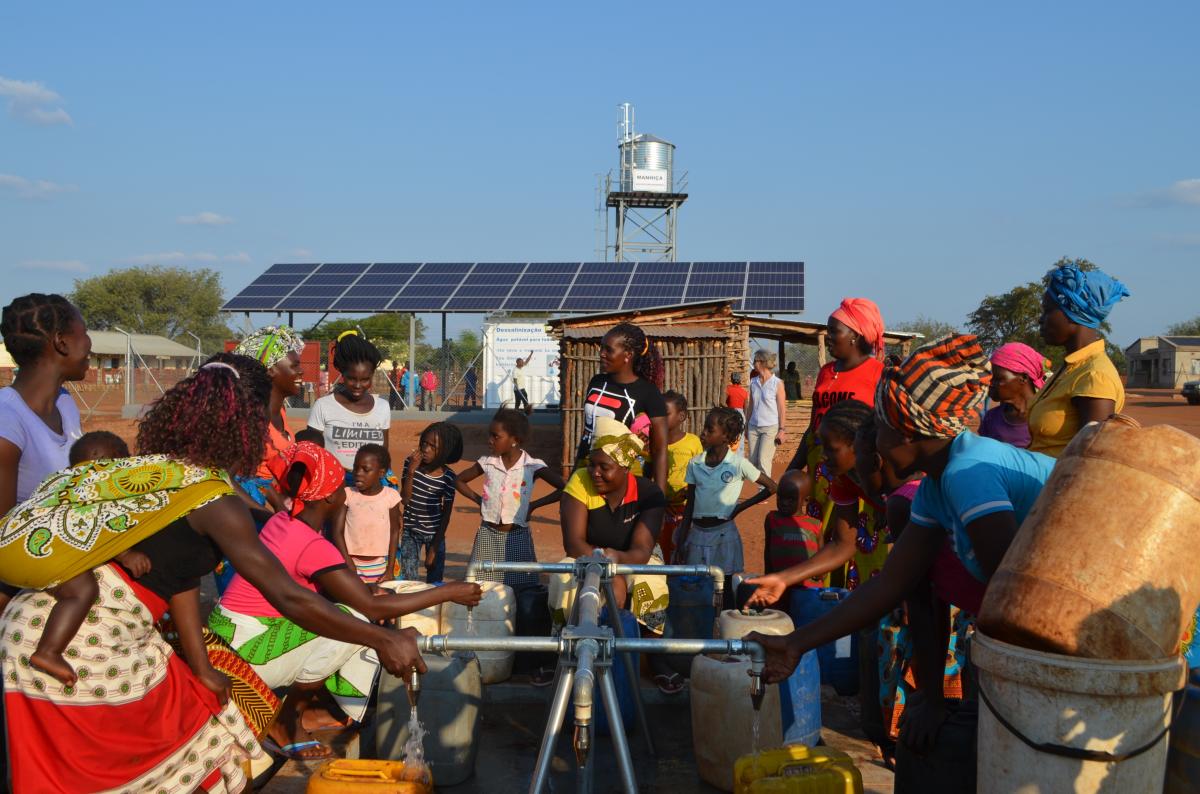Joint Action of Enabel and Mozambique Guarantees Access to Drinking Water through Affordable Clean Energy (Sustainable Development Goals 6 + 7)
The first battery-free solar-powered desalination unit on the African
continent
On the 28th of May 2018, the
construction of the first desalination system built by Enabel was completed.
Enabel, in cooperation with the Brussels’ Region Environment Fund (IBGE-BIM), started earlier this year with the installation of desalination systems in 6 different
communities in Mozambique’s Gaza province, where the water sources are too
saline for drinking. Through an innovative process groundwater is filtered
using solar power without having to use a battery to store the energy, making
this the first battery-free solar-powered brackish groundwater desalination
unit in Africa (see below article for technical information on the process).
Two international companies with Mozambican branches were chosen to install the
water supply network and taps, as well as to carry out further operation,
maintenance and management. Every district has one operator (six in total) and
there is one general manager in Chokwe to respond to problems or questions. On
the 28th of May the community of Manhiça tested the quality of the
water and the public taps for the first time. With some reluctance the
community opened the taps and tasted the water, which was followed by a
positive reaction by the village chief and all the people present.
In that same last week of May, during
the annual meeting of the water and sanitation sector, the government of
Mozambique reiterated its commitment to provide drinking water to the entire
Mozambican population by 2030, as part of the Sustainable Development Goals
(SDGs). SDG 6 targets to achieve
universal and equitable access to safe and affordable drinking water, as well
as
adequate and equitable sanitation and hygiene for all by 2030. It is
estimated that in Mozambique 55% of the population currently have access to
water: 43% in rural areas and 77% in urban areas. Last year, 80 water supply
systems and 3,000 manual pumps were built in the entire country. The Minister
of Public Works, Housing and Water Resources stated that in 2018 the construction of more than 140 water supply
systems is planned. Special attention will be given to desalination systems
given the presence of mostly unclean and brackish water in Mozambique. With a
long and strenuous road ahead to achieve SDG 6, Mozambique can count on strong
cooperation partners such as Enabel for support, expertise, and innovative
solutions.
The Water Gaza project of Enabel entered
its last phase and will complete all activities at the latest beginning of 2019.
Thanks to the project 23 water supply systems have been built in the Gaza
Province, benefitting 51,000 people, which is around 23% of the rural
population in the districts of Northern Gaza. Furthermore, Enabel has put a
strong focus on digitisation, leading to the recognition of Gaza as the first
province in the whole of Mozambique with a complete and reliable database on
water infrastructures (Akvo Flow Database). Lastly, innovative
solar-powered desalination units are being built in five other towns similar to
Manhiça in order to provide the population with drinking water close to home.
Desalination has shown to be a viable solution for rural areas in
Mozambique, where sometimes up to 70% of the water sources are too salty to
safely drink. Enabel has played an important role in advocating these
innovative technologies and has provided the Mozambican government with a
successful pilot case with its Water Gaza project. Furthermore, Enabel worked
strongly on guaranteeing the sustainability of the project by training local
staff, as well as contracting Mozambican private companies for the management
of the water supply systems and the distribution. Enabel involved the
Mozambican government from the start by encouraging new innovative solutions
for the water supply issue in Mozambique. Through the use of solar panels the
project has even made an innovative link with SDG 7, promoting affordable and
clean sustainable energy for all. The
new projects of Enabel in Mozambique
specifically focus on SDG 7, as they aim to increase access to renewable
electricity in rural areas through capacity building of the Ministry of Energy
(CB MIREME project) and investments in renewable energy systems (RERD II
project). In conclusion, the Water Gaza project is a small, but important step
in Mozambique’s road to achieving SDG 6 and will benefit the general livelihood
of the target communities in Northern Gaza.
Technical info on desalination with solar energy without use of a battery
The groundwater is pumped through two different kind of filters: the first one
filters out the suspended solids (e.g. sand particles), while the second one further
pre-treats the brackish water. In a third phase this pre-treated water will be
transferred through a pump under pressure which stows the water through
membranes of reverse osmosis. Such membranes reject most of the dissolved salts
and produce drinking water with a salt concentration of less than 400 uS/cm.
The drinking water is stored in elevated water tanks, while around 25% of the
water is rejected in a separate basin. This entire process is powered by solar
panels without the use of a battery. This is made possible by a simple and
patented device that stores pressurized water, allowing pressure variations up
to 90% power swings during production. In addition, rotary positive
displacement pumps (more than 92% output of water) are used instead of
centrifugal pumps (with output limited to 50 to 60%). Moreover, energy is
recuperated from the concentrates by recirculating it through a recuperator through
the membranes. Both innovative adjustments reduce energy consumption with almost
60% and optimise the lifespan of the membrane (5 to 7 years).
This article was written by Anke Van de Velde with the valuable input of Hélder Cumbi and revised by Evert Waeterloos.
Latest news from this project
No news

